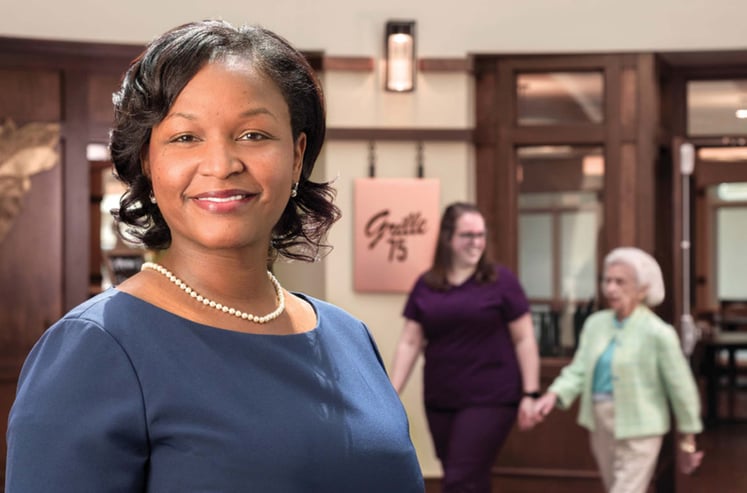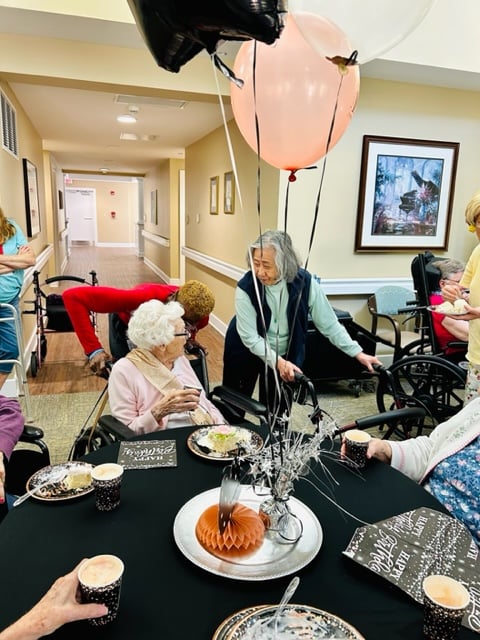
When it's time for an elderly loved one with dementia or Alzheimer’s to move to a retirement home for better memory support and assisted living services, it’s essential to consider a senior care provider’s ownership and mission when making your selection.
In Louisville (and indeed throughout Kentucky), there are for-profit, corporate-owned nursing homes and not-for-profit, often faith-based retirement communities. Each type comes with pros and cons.
Today, let’s take a look at the differences between the two so that you and your family will be well-informed when you make a decision about placement for your older loved one.
1. For-profit nursing homes can cost you less out-of-pocket, but . . .
As with any business that must show a profit and give its shareholders an attractive rate of return on their investments, for-profit nursing homes must make hard choices. To provide costly extra care or life-enriching activities for residents, they must accordingly raise prices.
But raising prices undermines corporate nursing homes’ top selling point. So, those little extras — private rooms, group outings to community events or restaurants, advanced memory support services, cheery interior decor, and modern design — often go by the wayside to improve profit margins.
2. Quality of care is typically better in not-for-profit retirement communities.
Studies conducted over the last 30 years have repeatedly shown that not-for-profit retirement care providers render better care to the elderly.
A 1986 report by the Institute of Medicine found that for-profit nursing facilities “tended to devote fewer resources to direct patient care, resulting in poorer quality of care for residents.” Conversely, the same study found that "not-for-profit nursing facilities provided better care.”
In 2009, the Government Accounting Office (GAO) reported that a study of the nation’s lowest-performing nursing homes, as identified by the Centers for Medicare and Medicaid Services (CMS), showed that those U.S. nursing homes providing the worst care were “more likely to be for-profit,” had nearly 24 percent fewer RNs on duty per resident per day, and had lower overall staff-to-resident ratios at all hours.

Nellie Sidebottom recently celebrated her 100th birthday with many friends at Episcopal Church Home.
A follow-up study published by the GAO in 2011 showed that corporate nursing homes acquired between 2004 and 2007 by the nation’s top 10 private equity firms “had more total deficiencies than not-for-profit facilities” and “reported lower total nurse staffing ratios.”
By contrast, a 2009 report released by LeadingAge New York showed that hospitalization rates were lower for residents of not-for-profit retirement care communities and that not-for-profit homes generally had fewer critical deficiencies than their for-profit counterparts.
3. Mission matters.
Not-for-profit retirement care communities, especially those founded on or operated along with faith-based values, often provide care from a mission-driven standpoint rather than a financially-motivated standpoint.
That’s not to say that not-for-profit entities don’t seek to minimize costs. But when not-for-profit organizations realize cost savings or see revenue windfalls, those surpluses are used either to subsidize care for residents who cannot afford quality care on their own or to improve the overall quality of care across the organization.
A Chicago Tribune examination of the retirement care industry found that when care providers organize themselves around a “mission-driven” ethos, it “implies they have a higher purpose of serving residents.” In other words, they view senior care as a calling — not a money-making enterprise.
That’s certainly true of us here at Episcopal Church Home.
We believe that rendering care to our elders is our sacred duty. As an Episcopal Retirement Services community, we strive to make sure our residents, and their families, know that we are not only deeply committed to providing Kentuckians with the best-quality senior care, we’ll honor our promise never to ask a resident to leave our community due to financial hardship.
If your family is searching for a retirement care provider for your senior loved one, we’re here and able to help. Click here to learn more about our Louisville retirement community.
Then, contact us to arrange a visit. We’d love to show you the difference between a not-for-profit retirement home in your elderly relative’s quality of life.
View More: Dementia Guidebook











